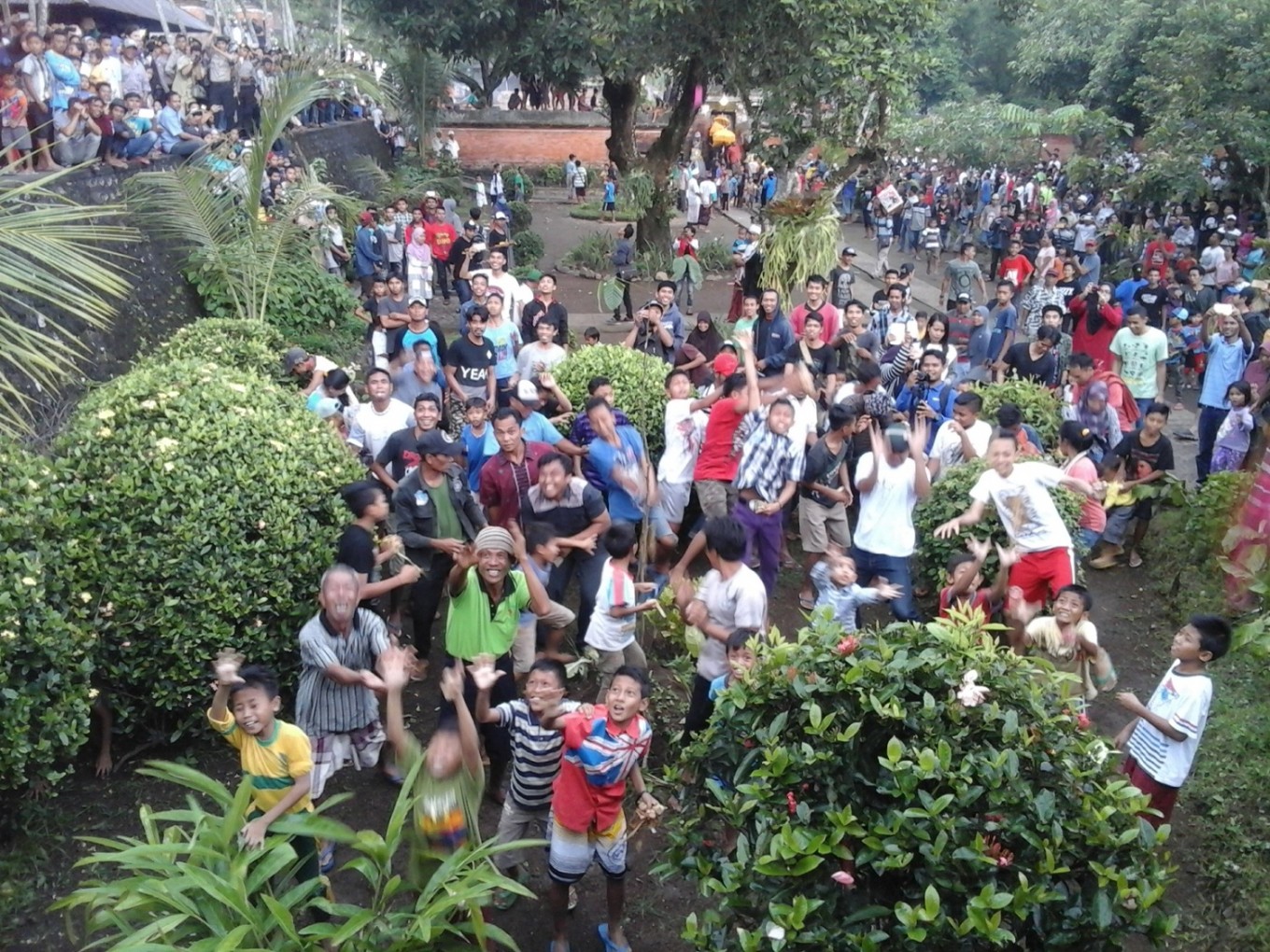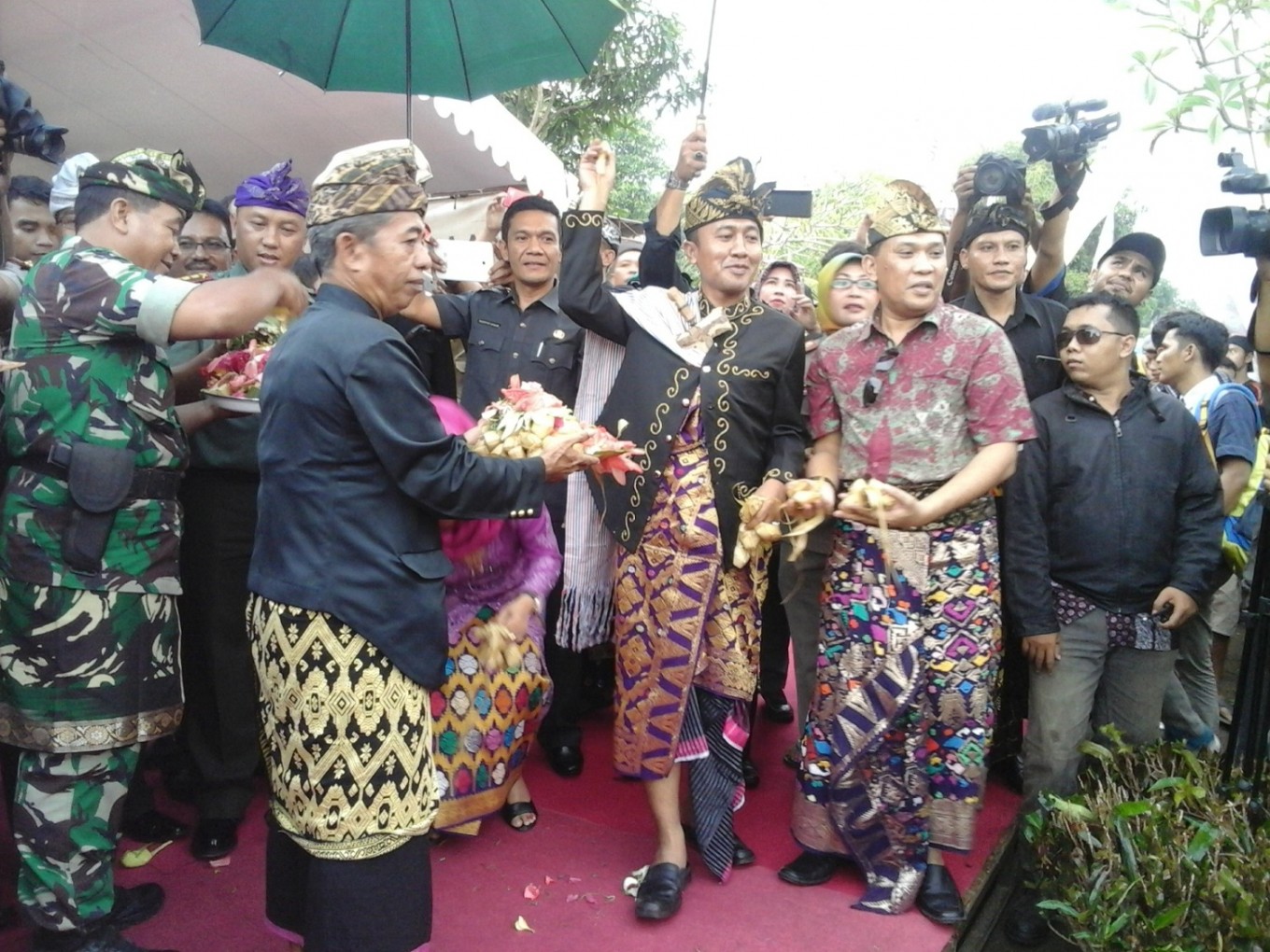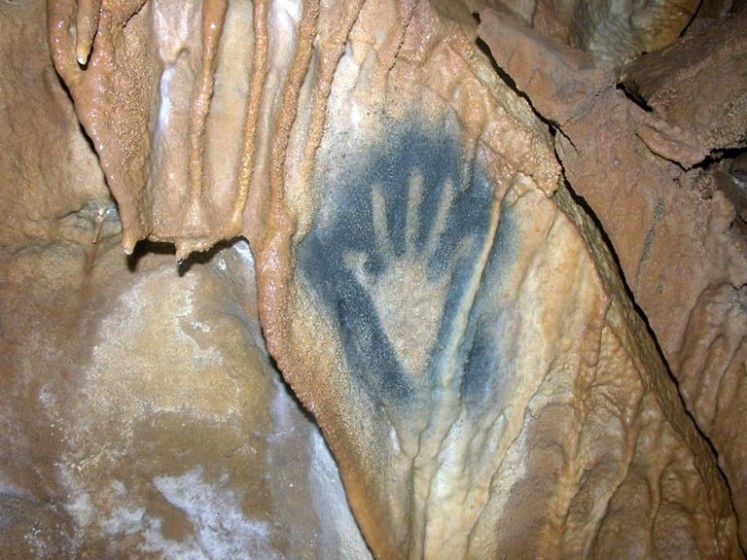Popular Reads
Top Results
Can't find what you're looking for?
View all search resultsPopular Reads
Top Results
Can't find what you're looking for?
View all search resultsWest Lombok tradition celebrates tolerance among Muslims, Hindus
Change text size
Gift Premium Articles
to Anyone
H
undreds of people from different religions flocked to Lingsar village in Lingsar district, West Lombok regency, on Tuesday afternoon to participate in perang topat, also known as perang (war) ketupat (rice cakes boiled in plaited coconut leaves).
The participants, consisting of people of all ages, scrambled to snatch ketupat as it was being distributed, and later threw the items to one another.
This ancient tradition involving the Muslim and Hindu people has been a symbol of religious harmony and tolerance in West Lombok.
"War used to be about hatred and anger and it involved casualties. But perang topat in Lingsar is our ancestors' tradition that highlights peace, tolerance and harmony between Muslims and the Hindu people. This is what we should learn; that our ancestors have taught us the values of unity in diversity, how we can be different but still live in peace with one another," said West Lombok Regent Fauzan Khalid during the opening of Perang Topat Festival 2016 in Lingsar Temple complex in West Lombok, around 9 kilometers east of Mataram, the capital of West Nusa Tenggara.
(Read also: Beach in Lombok a hidden paradise for kite-surfers)
 Residents of Lingsar village take part in perang topat on Dec. 13 in Lingsar Temple complex, West Lombok.
(JP/Panca Nugraha)
Residents of Lingsar village take part in perang topat on Dec. 13 in Lingsar Temple complex, West Lombok.
(JP/Panca Nugraha)
The temple itself was built in 1759 during the era of King Anak Agung Gede Ngurah, a descendant of King Karangasem Bali who once conquered parts of Lombok Island in the 17th century. The complex is quite unique as it holds two very different huge buildings, namely Gaduh Temple, which is used as a place of worship for Hindus, and Kemaliq building, which is considered sacred by some Muslim Sasak people as it is still used until today for traditional ritual ceremonies.
Sasak humanist Suparman Taufik said the procession of perang topat was a form of gratitude to God for the blessings they received throughout the year. This is said to be related to the existence of the Langser water springs situated right beside Lingsar Temple complex.
For centuries, the Lingsar people believed that the water springs came into existence after Raden Mas Sumilir, a Muslim missionary in Lombok during the 15th century, thrust his cane to the ground. Until today, the Langser (now known as Lingsar) water springs are able to water the farming grounds for not only the Lingsar community but also for some parts of Central Lombok. It allows Lingsar farmers to plant and harvest paddies thrice a year.
Perang topat has always been conducted on the 15th day of the 7th month in the Sasak Lombok calendar, also known as puranam sasih kepitu (the seventh full moon), or the 15th day of the 6th month in the Hindu Bali calendar, also known as puranam sasi kenem (the sixth full moon). This year, it falls on a full moon night on Dec. 13.
"Perang topat started during Rarak Kembang Waru, or the falling of waru flower, which was around 5 p.m. Later during the night, Hindu people will celebrate odalan, or the birthday of Lingsar Temple, by conducting Pujawali ceremony. While Muslims conducted napak tilas (commemoration) of Raden Mas Sumilir, a Muslim missionary from Demak, Central Java who spread Islam in Lombok," said Suparman.
(Read also: West Nusa Tenggara eyes sports tourism after Lombok race)
 West Lombok Regent Fauzan Khalid during the opening of perang topat festival in Lingsar Temple complex in West Lombok on Dec. 13.
(JP/Panca Nugraha)
West Lombok Regent Fauzan Khalid during the opening of perang topat festival in Lingsar Temple complex in West Lombok on Dec. 13.
(JP/Panca Nugraha)
People began arriving at Lingsar Temple complex since Tuesday afternoon. Both the Gaduh Temple and Kemaliq prepared offerings in the form of fruits and crops and, of course, ketupat. The latter was prepared by locals who hailed from various hamlets in Lingsar village, which include Hindus and Muslims.
These offerings were later paraded circling the Kemaliq building accompanied with traditional music. While the parade was ongoing, hundreds of local residents and visitors waited in the Kemaliq yard for the topat to be distributed and thrown. They believe that the ketupat left after the "war" will bring good luck for their upcoming harvest.
"This has happened since a long time ago; if you get topat, you will have good luck. Farmers can expect to have a good harvest; merchants can expect to have a good sale," said Suharyani, 45, a Lingsar resident who joined the event.
This year, in addition to local people, many domestic and foreign tourists also participated to see first-hand the popular tradition.
"This is the only war in the world that is done without hatred or casualties as it is a symbol of brotherhood and tolerance," said Fauzan.
He added that West Lombok, home to multi-ethnic residents, is a convenient destination for tourists. "This is the culture richness of West Lombok; the colors of culture." (kes)











